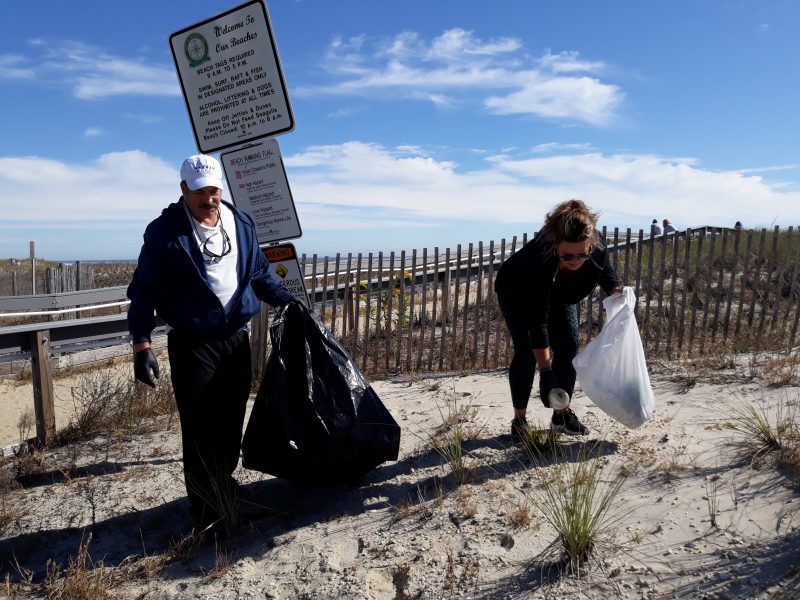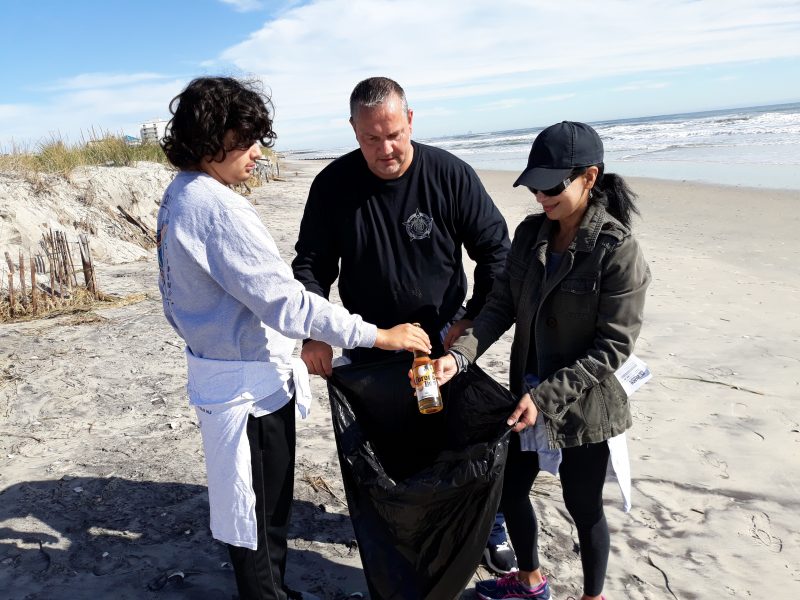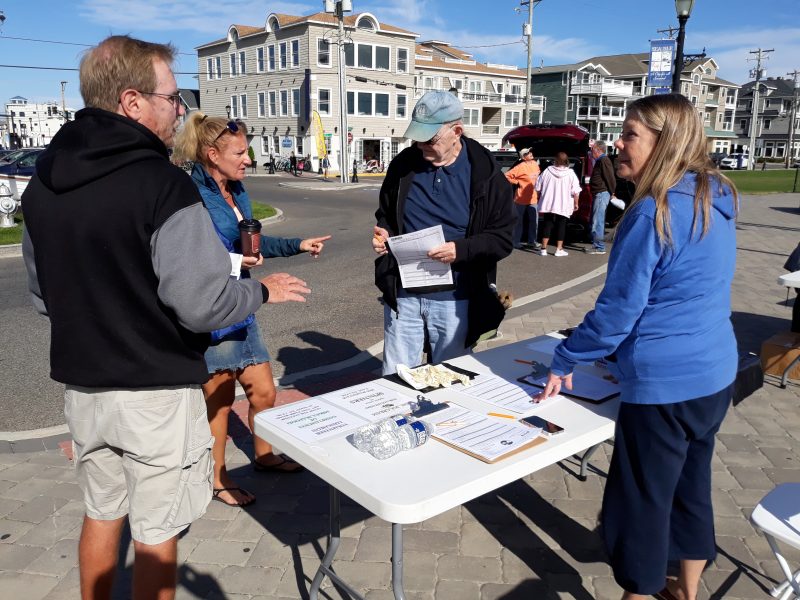 By DONALD WITTKOWSKI
Plastic trash and cigarette butts continue to be the worst source of litter found on Sea Isle City’s beaches, according to a new report that warns of environmental dangers to the shoreline and marine life from pollution.
The report, compiled by the city’s Environmental Commission, analyzes the types of trash and debris that were collected during a communitywide beach cleanup on Oct. 12.
Altogether, 8,615 pieces of trash were removed from the beaches and dunes by the nearly 200 volunteers who participated in the cleanup, the report said.
Consistent with previous cleanups, discarded plastic items were by far the most common type of junk found on the beaches on Oct. 12 – 6,928 pieces in all, or 80 percent of the entire load of trash that was picked up, according to the report.
They included plastic bags, bottles, food containers, candy wrappers, caps, lids and straws. Other common types of trash included metal and paper items, such as cans, bottle caps and food wrappers.
Although a new statewide smoking ban took effect on New Jersey beaches and public parks in January 2019, cigarette butts are the single-biggest type of trash on Sea Isle’s shoreline. Volunteers picked up a total of 1,154 cigarette butts during the Oct. 12 cleanup, the report said
“Based on the data collected and the observations recorded by volunteers, cigarette filters remain a problematic item along the beach and on the dunes. Cigarette filters or butts are the most common form of litter found in our Sea Isle beaches,” the report concluded.
The report notes that cigarette butts are a type of nonbiodegradable plastic containing heavy metals, such as arsenic, and toxic organic compounds, such as nicotine and hydrocarbons.
“These chemicals can also leach out of the cigarette butt and pose acute toxic effects to aquatic organisms,” it says.
The report concludes that more time and data are needed before it becomes clear whether the smoking ban will help to reduce the number of cigarette butts discarded on the beaches.
For instance, the number of cigarette butts removed from Sea Isle’s beaches in 2018, prior to the smoking ban going into effect, was roughly the same number of butts found during the Oct. 12 cleanup and another one in April 2019, according to the report.
“In order to assess the decrease of plastic cigarette filters over time and assess the effectiveness of the smoking ban, there is a need to gather further beach clean-up collection data,” it concludes.
By DONALD WITTKOWSKI
Plastic trash and cigarette butts continue to be the worst source of litter found on Sea Isle City’s beaches, according to a new report that warns of environmental dangers to the shoreline and marine life from pollution.
The report, compiled by the city’s Environmental Commission, analyzes the types of trash and debris that were collected during a communitywide beach cleanup on Oct. 12.
Altogether, 8,615 pieces of trash were removed from the beaches and dunes by the nearly 200 volunteers who participated in the cleanup, the report said.
Consistent with previous cleanups, discarded plastic items were by far the most common type of junk found on the beaches on Oct. 12 – 6,928 pieces in all, or 80 percent of the entire load of trash that was picked up, according to the report.
They included plastic bags, bottles, food containers, candy wrappers, caps, lids and straws. Other common types of trash included metal and paper items, such as cans, bottle caps and food wrappers.
Although a new statewide smoking ban took effect on New Jersey beaches and public parks in January 2019, cigarette butts are the single-biggest type of trash on Sea Isle’s shoreline. Volunteers picked up a total of 1,154 cigarette butts during the Oct. 12 cleanup, the report said
“Based on the data collected and the observations recorded by volunteers, cigarette filters remain a problematic item along the beach and on the dunes. Cigarette filters or butts are the most common form of litter found in our Sea Isle beaches,” the report concluded.
The report notes that cigarette butts are a type of nonbiodegradable plastic containing heavy metals, such as arsenic, and toxic organic compounds, such as nicotine and hydrocarbons.
“These chemicals can also leach out of the cigarette butt and pose acute toxic effects to aquatic organisms,” it says.
The report concludes that more time and data are needed before it becomes clear whether the smoking ban will help to reduce the number of cigarette butts discarded on the beaches.
For instance, the number of cigarette butts removed from Sea Isle’s beaches in 2018, prior to the smoking ban going into effect, was roughly the same number of butts found during the Oct. 12 cleanup and another one in April 2019, according to the report.
“In order to assess the decrease of plastic cigarette filters over time and assess the effectiveness of the smoking ban, there is a need to gather further beach clean-up collection data,” it concludes.

Brian and Lily Razzi and their son, Dillon, throw away an old bottle of beer they found on the beach during the Oct. 12 cleanup.
The report also includes comments from some of the volunteers who participated in the cleanup. Cigarette butts were repeatedly mentioned by the volunteers as a problem.
“Cigarette butts are more than plentiful,” one volunteer wrote.
“Tons of cigarette butts! All over the path and edge of boardwalk,” wrote another.
“Many cigarette butts and food containers,” was another comment.
“No cigarettes on beach, lots at beach access,” another volunteer said.
However, one volunteer wrote, “Less cigarette butts this year.”
Some of the volunteers suggested that Sea Isle should install more ashtrays or even sand buckets along the Promenade or the pathways to the beach to reduce the number of discarded cigarette butts.
Other types of beach trash prominently mentioned in the report were store plastic bags, foam plastics and straws
“They pose an environmental damage to the beach and especially to marine life,” the report says.
New Jersey is moving forward with a proposed ban on plastic grocery store bags, Styrofoam food containers and plastic straws.
In December, the Senate Budget and Appropriations Committee approved legislation that calls for single-use plastic bags to be banned one year after the law goes into effect.
The state legislation, if adopted by the full Legislature and signed into law by Gov. Phil Murphy, would supersede any ordinances banning plastic bags that have already been approved by local municipalities.

In all, nearly 200 volunteers took part in the Oct. 12 beach cleanup, a record turnout for the fall event, organizers said.
To prevent and minimize any harmful effects to the beaches and marine life, Sea Isle vendors could consider eco-friendly alternatives to replace the use of plastic store bags, Styrofoam food containers and straws, according to the Environmental Commission’s report.
Currently, some vendors in Sea Isle have already adopted the use of paper straws, the report notes.
The author of the report is Environmental Commission member Maria Andrews, who is the associate director of undergraduate programs for the Department of Earth and Environmental Science at the University of Pennsylvania. She was out of the country this weekend and unavailable for comment.
Twice a year, in the fall and spring, Sea Isle holds communitywide beach cleanups in partnership with Clean Ocean Action, a state environmental group. Sea Isle’s cleanup volunteers carefully catalog the types of trash and debris that are found. The information is sent to Clean Ocean Action as part of a statewide database from beach sweeps at shore towns across New Jersey.
Keeping the dunes, beaches and ocean as clean as possible is especially important in the summer season, when throngs of tourists arrive on vacation. Sea Isle wants to make a good impression on the visitors by having pristine beaches, city officials say.
 By DONALD WITTKOWSKI
Plastic trash and cigarette butts continue to be the worst source of litter found on Sea Isle City’s beaches, according to a new report that warns of environmental dangers to the shoreline and marine life from pollution.
The report, compiled by the city’s Environmental Commission, analyzes the types of trash and debris that were collected during a communitywide beach cleanup on Oct. 12.
Altogether, 8,615 pieces of trash were removed from the beaches and dunes by the nearly 200 volunteers who participated in the cleanup, the report said.
Consistent with previous cleanups, discarded plastic items were by far the most common type of junk found on the beaches on Oct. 12 – 6,928 pieces in all, or 80 percent of the entire load of trash that was picked up, according to the report.
They included plastic bags, bottles, food containers, candy wrappers, caps, lids and straws. Other common types of trash included metal and paper items, such as cans, bottle caps and food wrappers.
Although a new statewide smoking ban took effect on New Jersey beaches and public parks in January 2019, cigarette butts are the single-biggest type of trash on Sea Isle’s shoreline. Volunteers picked up a total of 1,154 cigarette butts during the Oct. 12 cleanup, the report said
“Based on the data collected and the observations recorded by volunteers, cigarette filters remain a problematic item along the beach and on the dunes. Cigarette filters or butts are the most common form of litter found in our Sea Isle beaches,” the report concluded.
The report notes that cigarette butts are a type of nonbiodegradable plastic containing heavy metals, such as arsenic, and toxic organic compounds, such as nicotine and hydrocarbons.
“These chemicals can also leach out of the cigarette butt and pose acute toxic effects to aquatic organisms,” it says.
The report concludes that more time and data are needed before it becomes clear whether the smoking ban will help to reduce the number of cigarette butts discarded on the beaches.
For instance, the number of cigarette butts removed from Sea Isle’s beaches in 2018, prior to the smoking ban going into effect, was roughly the same number of butts found during the Oct. 12 cleanup and another one in April 2019, according to the report.
“In order to assess the decrease of plastic cigarette filters over time and assess the effectiveness of the smoking ban, there is a need to gather further beach clean-up collection data,” it concludes.
By DONALD WITTKOWSKI
Plastic trash and cigarette butts continue to be the worst source of litter found on Sea Isle City’s beaches, according to a new report that warns of environmental dangers to the shoreline and marine life from pollution.
The report, compiled by the city’s Environmental Commission, analyzes the types of trash and debris that were collected during a communitywide beach cleanup on Oct. 12.
Altogether, 8,615 pieces of trash were removed from the beaches and dunes by the nearly 200 volunteers who participated in the cleanup, the report said.
Consistent with previous cleanups, discarded plastic items were by far the most common type of junk found on the beaches on Oct. 12 – 6,928 pieces in all, or 80 percent of the entire load of trash that was picked up, according to the report.
They included plastic bags, bottles, food containers, candy wrappers, caps, lids and straws. Other common types of trash included metal and paper items, such as cans, bottle caps and food wrappers.
Although a new statewide smoking ban took effect on New Jersey beaches and public parks in January 2019, cigarette butts are the single-biggest type of trash on Sea Isle’s shoreline. Volunteers picked up a total of 1,154 cigarette butts during the Oct. 12 cleanup, the report said
“Based on the data collected and the observations recorded by volunteers, cigarette filters remain a problematic item along the beach and on the dunes. Cigarette filters or butts are the most common form of litter found in our Sea Isle beaches,” the report concluded.
The report notes that cigarette butts are a type of nonbiodegradable plastic containing heavy metals, such as arsenic, and toxic organic compounds, such as nicotine and hydrocarbons.
“These chemicals can also leach out of the cigarette butt and pose acute toxic effects to aquatic organisms,” it says.
The report concludes that more time and data are needed before it becomes clear whether the smoking ban will help to reduce the number of cigarette butts discarded on the beaches.
For instance, the number of cigarette butts removed from Sea Isle’s beaches in 2018, prior to the smoking ban going into effect, was roughly the same number of butts found during the Oct. 12 cleanup and another one in April 2019, according to the report.
“In order to assess the decrease of plastic cigarette filters over time and assess the effectiveness of the smoking ban, there is a need to gather further beach clean-up collection data,” it concludes.
 Brian and Lily Razzi and their son, Dillon, throw away an old bottle of beer they found on the beach during the Oct. 12 cleanup.
The report also includes comments from some of the volunteers who participated in the cleanup. Cigarette butts were repeatedly mentioned by the volunteers as a problem.
Brian and Lily Razzi and their son, Dillon, throw away an old bottle of beer they found on the beach during the Oct. 12 cleanup.
The report also includes comments from some of the volunteers who participated in the cleanup. Cigarette butts were repeatedly mentioned by the volunteers as a problem.
 In all, nearly 200 volunteers took part in the Oct. 12 beach cleanup, a record turnout for the fall event, organizers said.
To prevent and minimize any harmful effects to the beaches and marine life, Sea Isle vendors could consider eco-friendly alternatives to replace the use of plastic store bags, Styrofoam food containers and straws, according to the Environmental Commission’s report.
Currently, some vendors in Sea Isle have already adopted the use of paper straws, the report notes.
The author of the report is Environmental Commission member Maria Andrews, who is the associate director of undergraduate programs for the Department of Earth and Environmental Science at the University of Pennsylvania. She was out of the country this weekend and unavailable for comment.
Twice a year, in the fall and spring, Sea Isle holds communitywide beach cleanups in partnership with Clean Ocean Action, a state environmental group. Sea Isle’s cleanup volunteers carefully catalog the types of trash and debris that are found. The information is sent to Clean Ocean Action as part of a statewide database from beach sweeps at shore towns across New Jersey.
Keeping the dunes, beaches and ocean as clean as possible is especially important in the summer season, when throngs of tourists arrive on vacation. Sea Isle wants to make a good impression on the visitors by having pristine beaches, city officials say.
In all, nearly 200 volunteers took part in the Oct. 12 beach cleanup, a record turnout for the fall event, organizers said.
To prevent and minimize any harmful effects to the beaches and marine life, Sea Isle vendors could consider eco-friendly alternatives to replace the use of plastic store bags, Styrofoam food containers and straws, according to the Environmental Commission’s report.
Currently, some vendors in Sea Isle have already adopted the use of paper straws, the report notes.
The author of the report is Environmental Commission member Maria Andrews, who is the associate director of undergraduate programs for the Department of Earth and Environmental Science at the University of Pennsylvania. She was out of the country this weekend and unavailable for comment.
Twice a year, in the fall and spring, Sea Isle holds communitywide beach cleanups in partnership with Clean Ocean Action, a state environmental group. Sea Isle’s cleanup volunteers carefully catalog the types of trash and debris that are found. The information is sent to Clean Ocean Action as part of a statewide database from beach sweeps at shore towns across New Jersey.
Keeping the dunes, beaches and ocean as clean as possible is especially important in the summer season, when throngs of tourists arrive on vacation. Sea Isle wants to make a good impression on the visitors by having pristine beaches, city officials say.